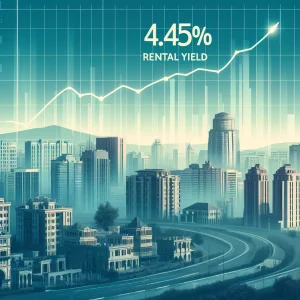Karnataka Plans 15% Hike in Guidance Value to Boost Revenue: Bengaluru Real Estate News
In a bid to generate additional revenue to fund its poll guarantee scheme, the Congress government in Karnataka is considering a 15% increase in the guidance value of properties. The move aims to leverage the growth in the real estate sector and promote online registration through the implementation of the web-based application Kaveri 2.0. The guidance value, which determines the minimum price for property transactions, has not been revised since 2019 due to the impact of the Covid-19 pandemic.
4 years on, Karnataka to hike guidance value by 15%

The Need for Increased Revenue: The Congress government seeks to raise additional revenue to support its poll guarantee scheme. By increasing the guidance value, the government aims to capitalize on the growth in the real estate sector and encourage online property registration, specifically in cities like Bengaluru. The guidance value is typically revised upward by 15% each year, but the Covid-19 situation prevented any increase since 2019.
Government’s Proposal and Approval: Previously, the BJP government had approved a proposal from the stamps and registration department to increase the guidance value. If necessary, the department may resubmit the proposal to the new government. Chief Minister Siddaramaiah is also in favour of the hike, as it would contribute to a projected 20% increase in government revenue without significantly impacting property market values.
Understanding Guidance Value and Its Implications:
Guidance value represents the minimum price at which a property transaction is registered. This value, determined by the government based on the property’s locality, plays a crucial role in calculating stamp duty and registration fees. For instance, properties priced above Rs 45 lakh attract a stamp duty of 5.6%, while properties within the range of Rs 20 lakh to Rs 25 lakh are subject to a 3% duty. Additionally, a buyer must pay 1% registration fee in addition to the stamp duty, regardless of the property’s value. Therefore, increasing the guidance value is expected to result in proportional revenue growth for the government.
Launch of Kaveri 2.0 App and Online Registration
To enhance transparency, efficiency, and reduce corruption, the government plans to introduce the web-based application, Kaveri 2.0. This application will be rolled out in 45 sub-registrar offices in Bengaluru, enabling the full-fledged online registration of properties and other relevant documents. Kaveri 2.0 has already undergone a successful pilot launch in other districts and a phased implementation since February, with Bengaluru reserved for the final phase to ensure a smooth and glitch-free registration process.
Benefits and Concerns: Government officials believe that increasing the guidance value will not significantly impact property market prices since most properties are registered at values lower than the prevailing market rates. A property on MG Road in Bengaluru, for instance, may have a guidance value of Rs 1.95 lakh per square meter but is sold at a higher price of at least Rs 2.5 lakh. Therefore, a 15% hike in the guidance value is expected to impact government revenue rather than the actual market prices.
However, Bhaskar Nagendrappa, the president of Credai Bengaluru, disagrees and suggests that an increase in guidance value will likely lead to higher property prices and a slowdown in the sector. Nagendrappa highlights the positive impact of last year’s 10% rebate, which resulted in increased sales and revenue.
Conclusion: The proposed 15% hike in the guidance value in Karnataka aims to increase government revenue while keeping property market prices relatively stable. By leveraging the growth in the real estate sector and promoting online registration through the Kaveri 2.0 app, the government seeks to enhance transparency and efficiency in property transactions. While there are differing opinions on the impact of the guidance value increase, the government’s goal remains to strike a balance between revenue generation and sustaining the growth trajectory of the real estate sector in Bengaluru.
Read the full article here 4 years on, Karnataka to hike guidance value by 15%
DISCLAIMER: Any opinions and views expressed on or through the above content/blogs are those of the designated authors/bloggers and do not necessarily represent views of Shanders. Further, the Company does not make any warranty as to the correctness or reliability of such content.
 Back to all articles
Back to all articles




